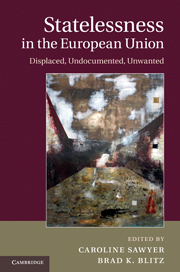12 - Conclusions
Published online by Cambridge University Press: 17 February 2011
Summary
Fifty years ago, against the background of attempts to resettle the casualties of political disaster and to ensure that there could be no more war and dehumanisation in Europe, Hannah Arendt was pessimistic about the ideal of universal human rights. She asserted that in a world of nation-states there could always be statelessness, and that without a nationality through which to establish their claims, the stateless would lack the right to any rights. Despite the international and regional Conventions and their courts and committees that appear to guarantee rights to everyone in the European jurisdiction, the research set out in this book demonstrates that aspects of Arendt's pessimism are justified today. Many of her claims regarding the limitations of the human rights regime to guarantee protection remain true, and her assertion that since what matters to the stateless is the inability to assure state protection, so de jure and de facto statelessness are equivalent, is notably borne out in this study.
Arendt offered a grounded theory of statelessness, drawn from her own experience, explicitly critical of the human rights regime which was then being established. In drawing conclusions from fieldwork with today's irregular migrants and unwanted immigrants, we have confirmed the observation made when we began considering this project – namely, that although there have been considerable strides in the machinery of human rights, political theory with respect to statelessness has hardly moved on since Arendt's day.
- Type
- Chapter
- Information
- Statelessness in the European UnionDisplaced, Undocumented, Unwanted, pp. 306 - 311Publisher: Cambridge University PressPrint publication year: 2011
- 1
- Cited by



